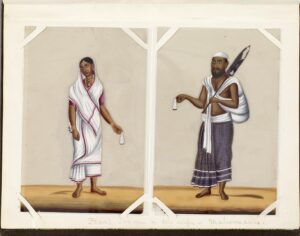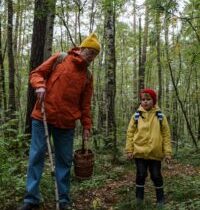Geological Time Includes the Present
 Darkness had long since fallen as we made our way along a winding road beside a lake. We were on our way home from a wonderful wedding celebration and the driver was watching closely for animals, as well as for rocks that might have fallen onto the road from the steep hills along the road. He remarked as he drove that one of his children had told him of a geology professor who had advised his class always to remember that “Geological time includes the present.”
Darkness had long since fallen as we made our way along a winding road beside a lake. We were on our way home from a wonderful wedding celebration and the driver was watching closely for animals, as well as for rocks that might have fallen onto the road from the steep hills along the road. He remarked as he drove that one of his children had told him of a geology professor who had advised his class always to remember that “Geological time includes the present.”
Reflecting on this insight, I realized that God’s time is like geological time in that respect – or maybe it’s vice versa? It includes the present.
As we begin these weeks of Lent, it’s good to remember that God is in this for the long-haul. We tend to think of times and seasons in our lives as having a beginning, a middle, and an end. But really, our lives are a long story, with parts and themes that weave in and out of the narration. The same is true for the history of God and humanity.
Moses and the Israelites traveled through the desert for forty years. Their release from captivity in Egypt had been totally unexpected. Granted, they had begged the Lord for relief from the forced labor and other conditions that had been imposed on them by the rulers of Egypt, but something as dramatic as the Passover and their release into the Sinai Peninsula was totally unexpected.
Who were they now? Where were they going? Who would be in charge? How did the Lord figure into it all? Moses had gone up to the mountain, into the cloud, and spoken with the Lord. His appearance was transformed by that experience. But what did that mean for everyday life?
Moses gathered the people as a group as their time in the desert together was drawing to an end and reminded them of the history of the Lord’s intervention that had led to their freedom. He again spoke to them of the Lord’s instructions for how they were to live. The ancient covenant with Abraham was still in effect. The narrative was ongoing. Their present time was part of God’s time and plan.
As they entered into their new land, planting crops, raising their flocks, they were not to forget the Lord’s care for them. They must remember to give thanks always for his care. So, as the first fruits of the land matured, they must be offered to the Lord as a thanksgiving gift at harvest time. They had received much from the Lord. The story of the Lord’s love and care for them was continuing, in a different setting and with different “props,” but the same Lord was providing for them still and yet.
Now, having set their gifts before the Lord, their God, they were to “bow down in his presence.” The story of their lives continued uninterrupted. (Deut 26:4-10)
Jesus too passed through many phases and seasons of life. His birth was unplanned by his parents. He had lived as a child, grown up revering the Lord, become a good Jewish man, learned a trade, become a regular fellow who was respectable and trusted as an adult. It was a relatively normal life, once he got past the first surprising beginning.
And then something unexpected happened, much like finding a big rock on the road by the lake or having an elk step out onto the road on a dark night. A prophet, who happened to be his cousin, began preaching along the Jordan River. This river stretches from the Sea of Galilee in the north to the Dead Sea in the south. The people had crossed the Jordan River when they first entered their land. It was the eastern border.
Jesus went down to the Jordan along with many other people. He listened to his cousin John speak of the coming of the Anointed One, the one long promised, who would restore the relationship with God and bring a new kingdom into being. Folks expected it to be a kingdom with rulers like those who would be replaced – the hated Roman conquerors.
Many prophets through the years had promised the coming of the Anointed One, the Messiah. Who would he be? When would he come? Would it still be many years in the future or would it be now?
Jesus entered into the water to be baptized and both he and John got a big surprise. The heavens opened, the Spirit of the Lord came upon him like a dove, and a voice said, “This is my beloved Son.”
What a dramatic turn in the life-story of a carpenter from a small town in Galilee! Wisely, Jesus didn’t just head home. Instead, he went out into desert lands to pray, to fast, and to begin to process what that all might have meant.
Forty days, he remained in the desert. He was thirsty and hungry. A voice, a tempter, whispered into his ear, “Command this stone to become bread.” Try it out, see what kind of powers you have now. You’re hungry, maybe you should do something about it…
But Jesus understood that was not the route he was to take. There’s more to life than bread.
Then the tempter offered him power – power over mighty kingdoms. Only one string attached, “I shall give to you all this power and glory … All this will be yours , if you worship me.” Again, Jesus didn’t take the bait, though many a person in history has, even in our days.
Finally, since Jesus kept responding that only God is in charge of such things, the tempter took him to a high point on the temple and suggested that God would protect him if he simply jumped off – angels would catch him. When Jesus again rejected the idea of putting God to the test, the tempter left him “for a time.” Not forever, just for the time-being. (Lk 4:1-13)
Jesus’ life-story took some very unexpected turns. He learned a lot in the process. Yet he remained faithful to the experience of discovering the Father’s love for him and the mission to share that wonderful news.
As the story of God’s presence and care for humanity continued to unfold, many came to hear and believe the good news of that love. They shared the joy and the challenges of sharing the story. The story turned out to be bigger than initially thought. It wasn’t like one rock sliding down a hillside. It was more like a hillside sliding down into the sea, reshaping a coastline.
St. Paul wrote to the people of Rome, reminding them of God’s presence throughout history and the ever-widening ripples of that presence. Not only is the Lord come for the Jews, he has come for all peoples. He is not an earthly ruler. Much more deeply, the Lord, the Word, is very near – in the heart and in the mouth. Words of faith are spoken and works of love are shared. In this we find salvation. “Everyone who calls on the name of the Lord will be saved.” (Rom 10:8-13)
We receive this word today as a promise given, received, and on-going. God’s time and Geological time include the present.
How do we live this in our lives today? Where are we called to love? Whom are we to respect and care for? How do we welcome people from other nations, the poor, the sick, the homeless? How do we respect each other and value the talents of each? Where will our legacy be found?
May we remember the Lord’s loving presence, the faithfulness of the One who loves us, and reach out in love to all the peoples of the world as we enter into and move through this season of Lent. God doesn’t love us just because we are perfect or powerful. We are loved at all times. We simply need to remember to be the stones on the hillside which he needs as he shapes and reshapes the world into a Kingdom of Love.
Readings for the First Sunday of Lent – Cycle C
Read More





































